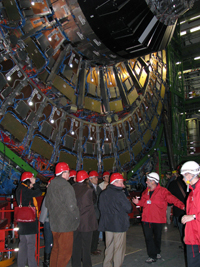Packing them in at the world's largest particle accelerator
 |
| Attendees visit the CMS experiment during CERN's Open Day, April 5. |
Tens of thousands of visitors, hours-long lines, shuttle buses between major sights-a typical day at Disneyland, perhaps, but a very atypical day at CERN, the European Organization for Nuclear Research.
This past weekend, more than 70,000 visitors flocked to the European particle physics laboratory for the LHC 2008 Open Days, the last opportunity to view the massive underground installations of the Large Hadron Collider. The LHC, which will become the world's highest energy particle accelerator when it starts running later this year, is located in a 27-kilometer ring 100 meters underground near Geneva, Switzerland.
"People started lining up at 7:30 a.m. for tickets to visit ATLAS, and even the small visit points were flooded," said CERN's Paola Catapano, one of the event organizers. "It was beyond expectations."
More than 30,000 visitors packed into elevators to visit the LHC accelerator, the smaller SPS accelerator, or the four huge LHC experiments: ALICE, ATLAS, CMS and LHCb. For those who preferred to stay aboveground, or who didn't arrive early enough to score tickets for a subterranean tour, there were dozens of activites available: exhibits on all aspects of LHC construction, superconductivity and superfluidity, computing center and control room tours, and even an LHC-experiment rugby tournament.
For kids, the most popular activities were the presentations and broadcasts by Fred, a host of the popular French children's show "C'est pas sorcier" (It's not magic). Fred traveled to each of the CERN visit points, often filling up assembly halls hours in advance. In one location, Fred's admirers arrived early enough to happen upon a lecture by two winners of the Nobel Prize in Physics, listening politely and then quizzing the eminent scientists about their career paths and what puts the "3" in helium-3.
While the weekend was geared towards members of the surrounding French and Swiss communities, visitors and journalists came from across Europe and even farther afield. A team of 1,500 volunteers was there to greet them, giving up their weekend to explain the technical aspects of antimatter production or hand out balloons.
See more
View more photos
-- Katie Yurkewicz
|